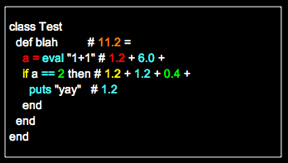The registration process for RubyConf 2007 is now open! The conference is due to be held at the Omni Charlotte Hotel in Charlotte, North Carolina in the United States between November 2 – 4 (Friday through Sunday). The official site hasn’t been updated yet (as of Friday September 7) but the registration form is available here. Tickets are $250. Read More
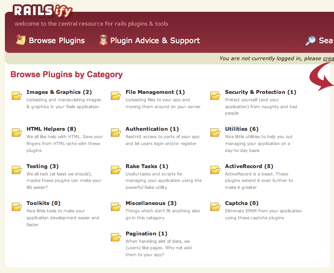
Railsify.com is a new site, developed by Adam Cooke, that acts as a central resource for Rails plugins and related tools (Rake tasks, toolkits, etc). Adam has a blog post with more background and details.
This isn’t the first such site. Agile Web Development has had a plugins directory for a while now, but Railsify is impeccably presented, has its own domain, and has even become part of a nascent “network” of Rails sites along with RailsForum.com and RailsWork.com. Read More
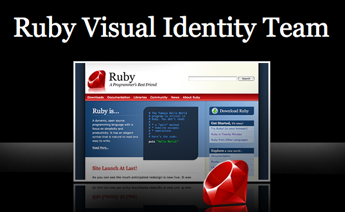
The Ruby Visual Identity Team are on the look out for a new “official” Ruby logo to represent Ruby in a more powerful way online. The team says that while they’ve released the current logo pack, it’s “not well known as a logo that represents the programming language Ruby itself.” To resolve this, the team are looking for a new Ruby logo that can be used to represent Ruby officially, and have launched a contest. The full details of the contest and how to submit your entries are available here.
Unlike the Rails(tm) logo, the team specify that while copyrights are to be assigned to the Ruby Association, the logo will be licensed under the Creative Commons Attribution-Sharealike license. Read More

RM-Install is a new, free Ruby on Rails stack developed by FiveRuns, a company that provides enterprise-level management solutions for Ruby on Rails applications. Of course, Rails and Ruby are already available for free, but RM-Install provides you will everything you need in one deployment. The components include Ruby 1.8.6, Rails 1.2.3, MySQL 5.0, SQLite 3.3, Subversion 1.4, Apache 2.2, OpenSSL, ImageMagick, Mongrel (with clustering support), Capistrano, Gruff, Rake and RMagick.
Currently RM-Install is available for OS X (Intel) and Linux only, but versions for OS X (PowerPC) and Windows will follow soon. Perhaps this is the holy grail of getting a Rails development environment up and running (with ImageMagick no less) in minutes? Read More
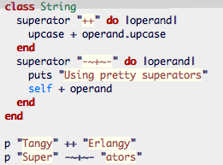
I know there’s going to be some controversy around this clever piece of code by Jay Phillips. He’s developed “Superators“, a library that finally makes it easy to create new operators within Ruby that look like line noise. Always wanted a “-~+~-” or “===~-+~++” operator? Now it’s within your grasp! As Aleks Clark says: “Job security and spiffy DSL construction in one neat package.” Read More
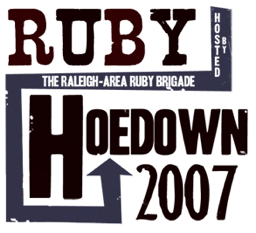
The Ruby Hoedown was a North Carolina based Ruby conference that took place on August 10-11, 2007. From all accounts, it was a roaring success, and now the videos of the presentations given have been made available. Topics include:
- Ruby and Rails Testing Techniques by Marcel Molina, Bruce Tate, and Chad Fowler.
- Exploring Merb by Ezra Zygmuntowicz.
- Next-Gen VoIP Development with Ruby and Adhearsion by Jay Phillips.
- Building Games with Ruby by Andrea O.K. Wright.
- Does Ruby Have a Chasm to Cross? by Ken Auer.
- Using C to Tune Your Ruby or Rails Application by Jared Richardson.
All this along with some lightning talks and two keynotes by Bruce Tate and Marcel Molina. Read More

You might recall, a few short months ago, that Dr. Nic built and released a site called MyConfPlan. Its prime objective was to enable RailsConf 2007 visitors to easily plan their schedules, although it had support for other events too. Dr. Nic has now put the site up for sale on eBay, and is donating all of the proceeds to charity as part of his pledge to donate to charity for RailsConf Europe. The auction ends in the next couple of days and is already at $470 Australian dollars (about $42 $386 US Dollars). Read More
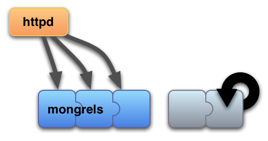
Most Rails developers will be familiar with *** ****’s Mongrel, a great HTTP library used by most Rails developers to either test or deploy their applications (it’s also pretty great for building your own basic HTTP handlers too, but I digress).
Sometimes when restarting applications after code updates, some requests can be “lost” in the whole process, particularly in high-traffic environments. Seesaw, developed by Max Muermann and Matt Allen, however, resolves this problem by restarting your mongrel processes one by one so that availability is ensured. Seesaw is available as a gem (gem install seesaw), although this blog post is essential reading to learn about integration with Nginx and Apache. Read More
Remember the infamous “Ruby on Rails Vs” videos by the guys at RailsEnvy.com that were such a hit at RailsConf? Well they’re back with two more..
Rails vs .Net
Rails vs PHP Redux
Back in August 2006, Satish Talim began a course of free Ruby lessons. Over 100 people signed up and found them useful. The success of the program even led to Satish founding the RubyLearning.com site, a great Ruby resource for newcomers to the language. Satish has just let me know that he’s decided to run the course again this year, so if you’re a Ruby newbie, head over to Satish’s latest blog post where he explains what the lessons are, what you’ll get out of it, and how the system works. Lessons start from this coming Monday, 27th August. Read More
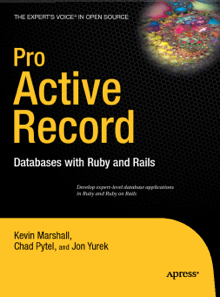
Pro ActiveRecord (previously known as “Pro ActiveRecord for Ruby”) by Kevin Marshall, Chad Pytel, and Jon Yurek is an advanced-level book about using the ORM database library used primarily by Ruby on Rails. To be published on September 10, 2007, the book is now ready to pre-order from Amazon.com for $26.39 (non affiliate link) and runs at 300 pages, so it’s likely to be a reasonably complete reference to using the library whether with Rails or not. Read More

In a similar vein to Rails Day comes the Rails Rumble, a 48 hour Ruby on Rails competition. You spend 48 hours developing a cool new Web application, and then all of the apps are judged through a peer-based ranking system in a variety of categories. The fun starts on September 8-9 and registration opens soon at RailsRumble.com. Sponsors include O’Reilly, ActiveReload, Apress, Peepcode, Linode, ActiveState, Pragmatic Programmers, Cashboard, Ruby East, Engine Yard, RoundHaus, and ThoughtBot, so be prepared for some great prizes. Linode is even putting up a VPS for every entrant to deploy their app.
With the extra time allowed and the peer-reviewing process, it seems like Rails Rumble could progress more smoothly than the Rails Days of past, and Ruby Inside will feature more information about the contest and the winners as things progress. Read More
![]()
Yelp.com is a site that lets people review bars, clubs, shops, and nightlife in various US cities. Yelp only began to offer an API a few weeks ago and Walter Korman wasted no time in releasing a client library for Ruby. It’s called, simply, “yelp” and lets you directly use Yelp.com’s data from your apps. You can do cool things like search for business reviews, locate business reviews by business phone number, and search for neighborhoods by geo-points or address/location. Read More
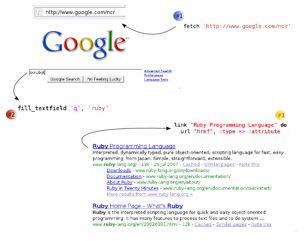
Okay, his title is a bit misleading, but Peter Szinek, developer of Ruby scraping toolkit scRUBYt!, has put together a great article showing the process, from start to finish, of scraping Google results using Ruby “in no seconds”. In reality, it’ll take you at least sixty to read the post. Read More







